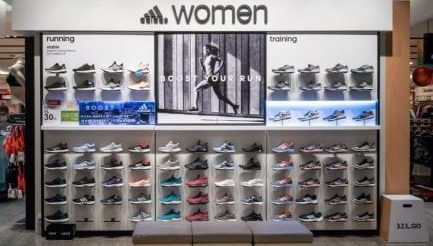These Boots Were Made For Walking: The Latest In Shoe Innovation

Shoes aren’t just shoes anymore – they are centers of retail innovation. And recent developments show how things might play out with footwear in 2020.
As is often the case, Nike is playing a big part in the changes happening in the footwear industry. The shoe brand has been awarded a patent by the U.S. Patent Office for its new blockchain-compatible sneakers, which are called “CryptoKicks,” according to reports.
The CryptoKicks will be attached to a system that will use blockchain to attach digital assets to the actual shoes. Nike’s plan is to track the ownership and legitimacy of the item using the blockchain system. When a customer buys CryptoKicks, they will get a digital asset that is tied directly to the shoe. This will create a sort of digital scarcity, as it will be tied to the manufacturing of the sneakers.
“When a consumer buys a genuine pair of shoes, a digital representation of a shoe may be generated, linked with the consumer and assigned a cryptographic token, where the digital shoe and cryptographic token collectively represent a ‘CryptoKick,’” the patent said.
If the sneakers are sold to a different person, ownership can be transferred using the digital assets and system. The assets get stored in a “digital locker,” which functions as a crypto wallet of sorts. Also, the owners of the shoes will be able to “intermingle or breed the digital shoe with another digital shoe to create ‘shoe offspring’ and have the offspring made as a new, tangible pair of shoes.”
Shoes and Re-commerce
That’s not all that’s happening with footwear innovation.
Shoe Bank is a platform that lets users exchange a pair of shoes they no longer to receive a different pair from another user. Through the Shoe Bank re-commerce platform, consumers can upload pictures of the shoes that they don’t wear and get credit for a new pair. “So every pair you upload will entitle you [to] another pair of shoes that you want,” CEO and Co-founder Roni Harel told PYMNTS.
If a consumer has a pair of Zara shoes and a pair of Gucci shoes, she can upload them both and receive two credits in return – but not all credits are equal. The company divides the credits into tiers of silver, gold and platinum categories based on brands and pricing. The silver tier includes the less prestigious end of shoes, with the inclusion of brands such as Zara or H&M. Shoes from a high-end brand such as Gucci or Louis Vuitton would fall into the platinum level. Brands in between those levels would fall into the gold tier. As a result, a consumer couldn’t offer a pair of Zara shoes to the bank and receive Gucci shoes in return. But if she uploads Louis Vuitton or Prada shoes, she could receive those Gucci shoes.
When it comes to shoes on the platform, Shoe Bank seeks pairs that have only been worn once or twice, which consumers might have gotten by mistake or for a special occasion, such as a picture or a wedding. Consumers receive reviews from other swappers as well as from the admin. When users receive four reviews with a 4.5-star rating or higher, they will become a Super Swapper, which Harel said is like Airbnb’s Superhost level.
Users who attain that premium level can receive some special benefits. For example, they can be the first to see new arrivals 24 hours before everyone else and can receive special premium member offers. They can also put a certain shoe on hold for a maximum of four hours while they make their decisions. When it comes to the advantages of swapping shoes overselling them in general, the company says consumers might only get a fraction of a shoe’s value if they sell a pair.
Footwear is never boring, and that truth will hold into the new decade.
